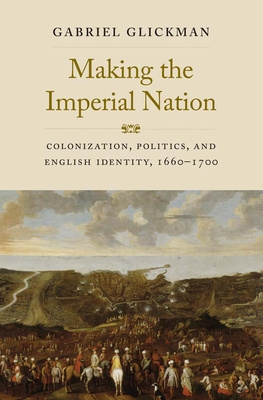Making the Imperial Nation: Colonization, Politics, and English Identity, 1660-1700

Making the Imperial Nation: Colonization, Politics, and English Identity, 1660-1700
How did the creation of an overseas empire change politics in England itself? After 1660, English governments aimed to convert scattered overseas dominions into a coordinated territorial power base. Stuart monarchs encouraged schemes for expansion in America, Africa, and Asia, tightened control over existing territories, and endorsed systems of slave labor to boost colonial prosperity. But English power was precarious, and colonial designs were subject to regular defeats and failed experimentation. Recovering from recent Civil Wars at home, England itself was shaken by unrest and upheaval through the later seventeenth century. Colonial policies emerged from a kingdom riven with inner tensions, which it exported to enclaves overseas. Gabriel Glickman reinstates the colonies within the domestic history of Restoration England. He shows how the pursuit of empire raised moral and ideological controversies that divided political opinion and unsettled many received ideas of English national identity. Overseas ambitions disrupted bonds in Europe and cast new questions about English relations with Scotland and Ireland. Vigorous debates were provoked by contact with non-Christian peoples and by changes brought to cultural tastes and consumer habits at home. England was becoming an imperial nation before it had acquired a secure territorial empire. The pressures of colonization exerted a decisive influence over the wars, revolutions, and party conflicts that destabilized the later Stuart kingdom.
PRP: 288.00 Lei
Acesta este Prețul Recomandat de Producător. Prețul de vânzare al produsului este afișat mai jos.
259.20Lei
259.20Lei
288.00 LeiLivrare in 2-4 saptamani
Descrierea produsului
How did the creation of an overseas empire change politics in England itself? After 1660, English governments aimed to convert scattered overseas dominions into a coordinated territorial power base. Stuart monarchs encouraged schemes for expansion in America, Africa, and Asia, tightened control over existing territories, and endorsed systems of slave labor to boost colonial prosperity. But English power was precarious, and colonial designs were subject to regular defeats and failed experimentation. Recovering from recent Civil Wars at home, England itself was shaken by unrest and upheaval through the later seventeenth century. Colonial policies emerged from a kingdom riven with inner tensions, which it exported to enclaves overseas. Gabriel Glickman reinstates the colonies within the domestic history of Restoration England. He shows how the pursuit of empire raised moral and ideological controversies that divided political opinion and unsettled many received ideas of English national identity. Overseas ambitions disrupted bonds in Europe and cast new questions about English relations with Scotland and Ireland. Vigorous debates were provoked by contact with non-Christian peoples and by changes brought to cultural tastes and consumer habits at home. England was becoming an imperial nation before it had acquired a secure territorial empire. The pressures of colonization exerted a decisive influence over the wars, revolutions, and party conflicts that destabilized the later Stuart kingdom.
Detaliile produsului









